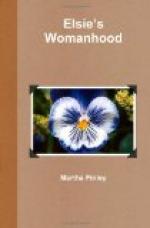“We will, at least, hope for better things, little wife,” her husband said, drawing her to him with caressing motion. “What do your letters say?”
“They are full of the war; it is the all-absorbing theme with them, as with us. Aunt Adelaide’s is very sad. Her heart clings to the South, as ours do; yet, like us, she has a strong love for the old Union.
“And she’s very found of her husband, who, she says, is very strong for the Government; and then, besides her distress at the thought that he will enlist, her heart is torn with anguish because her brothers and his are in the opposing armies.
“Oh, Edward! isn’t it terrible? Civil war in our dear land! So many whom we love on both sides!”
There was a moment of sorrowful silence. Then her father asked, “What does Enna say?”
“She is very bitter, papa: speaks with great contempt of the North; exults over the fall of Fort Sumter and the seizure of United States property; glories in the war-spirit of Dick and Arthur, and sneers at poor Walter because he is silent and sad, and declines, for the present at least, to take any part in the strife. Grandpa, she says, and his mother, too, are almost ready to turn him out of the house; for they are as hot secessionists as can be found anywhere.
“I have a letter from Walter too, papa. He writes in a very melancholy strain; hints mildly at the treatment he receives at home; says he can’t bear the idea of fighting against the old flag, and still less the old friends he has at the North, and wishes he was with us or anywhere out of the country, that he might escape being forced to take part in the quarrel.”
“Poor fellow!” sighed Mr. Dinsmore. “Ah, I have a letter here from my father that I have not yet opened.”
He took it from the table as he spoke. His face darkened as he read, the frown and stern expression reminding Elsie of some of the scenes in her early days; but he handed the missive to Rose, remarking, in a calm, quiet tone, “My father expects me to be as strong a secessionist as himself.”
“But you’re for the Union, papa, are you not?” asked Horace. “You’d never fire upon the Stars and Stripes—the dear old flag that protects us here?”
“No, my son. I love the dear South, which has always been my home, better far than any other of the sections; yet I love the whole better than a part.”
“So do I!” exclaimed Rose warmly; “and if Pennsylvania, my own native State, should rebel against the general government, I’d say, ’Put her down with a strong hand’; and just so with any State or section, Eastern, Northern, Middle or Western. I’ve always been taught that my country is the Union; and I think that teaching has been general through the North.”
“It is what my mother taught me, and what I have taught my children,” said Mr. Dinsmore; “not to love the South or my native State less, but the Union more. I was very young when I lost my mother; but that, and some other of her teachings, I have never forgotten.”




